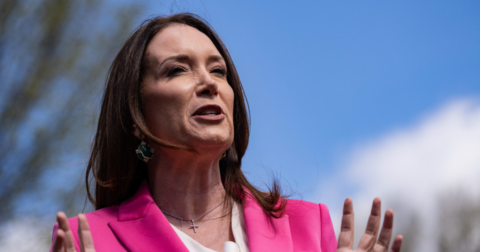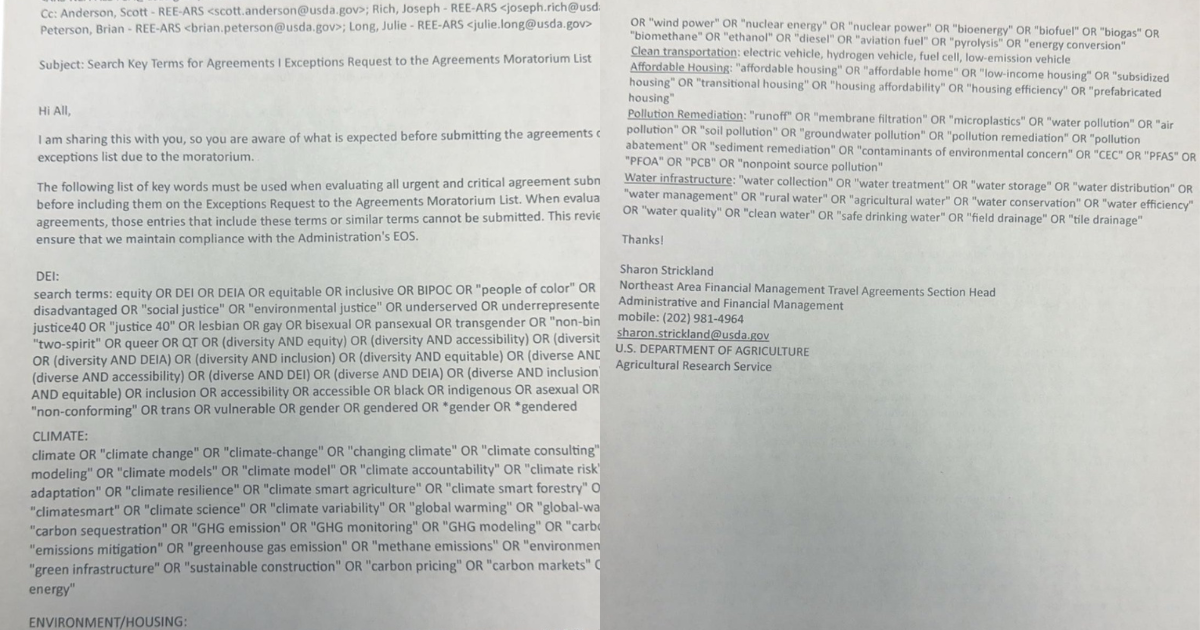Solutions
West Hollywood Committed to Plant-Based Food. Here’s What That Looks Like So Far
Climate•6 min read
News
Over 100 words and phrases are now banned, many of them essential to any discussion of climate.


Words by Seth Millstein
“Safe drinking water,” “greenhouse gas emissions,” and “climate change” are just a few of the 100+ words and phrases now banned at the Department of Agriculture’s research division, according to a recently-leaked memo. More Perfect Union reports that in March, staff at the USDA’s Agricultural Research Service (ARS) were sent a long list of words and phrases by a section head and told that they may no longer use any of them in certain official contexts. The memo was sent by Sharon Strickland, the Northeast Area Financial Management, Travel and Agreements Section Head at the ARS, to staff. The ARS is the research wing of the USDA, overseeing over 600 research projects and 2,000 scientists.
The photo of the leaked memo is partially cropped, and some of the words aren’t visible, so the details and precise nature of the directive aren’t clear. In general, the memo appears to state that staff are forbidden from submitting agreements and other contracts that use any of the forbidden words.
“Make no mistake, under President Trump and Secretary Rollins, USDA is getting back to work and putting farmers first — not woke ideology,” a USDA spokesperson told Sentient in a statement. “The leaked list of terms currently circulating was created by career employees tasked with reviewing active awards to ensure compliance with the President’s priorities and relevant Executive Orders. Leaders at USDA were not involved in drafting this list of terms and did not send that list to anyone.”
Strickland, who did not respond to Sentient’s request for clarification, has worked at USDA since September 2021. Despite the spokesperson’s statement that leadership did not draft nor circulate the list of terms, reporting has found similar lists distributed at multiple federal agencies.
In an email interview with Sentient, Rep. Chellie Pingree (D-ME) denounced the memo and said that if implemented, the changes would “actively make our communities less healthy and safe.”
“It’s not surprising that this Administration would go after anything they deem ‘woke,’ or at all related to climate change,” Pingree says. “But to target basic terms that are fundamental to agricultural research is beyond the realm of reason. I am sure that everyone — regardless of where they live (or their political party) — wants to have clean and safe drinking water, affordable housing, clean air, and wants to know if there’s PFAS in their soil.”
PFAS refers to per- and polyfluoroalkyl substances, a class of synthetic chemicals that are used in many common products and take an extraordinarily long time to break down. PFAS are common not only in soil and water around the world, but in the blood of many humans and animals as well.
President Donald Trump and the Republican Party have long been hostile to environmentalism and government efforts to address climate change. Many of the newly banned words reflect this mindset: “Global warming,” “climate science,” “alternative energy,” “methane emissions,” “pollution remediation,” “clean water,” “solar energy,” “microplastics,” “water conservation,” “soil pollution” and “contaminants of environmental concern” are among the forbidden phrases.

The list also includes a section of words that are banned as a result of the Trump administration’s assault on diversity, equity and inclusion initiatives. These phrases include “environmental justice,” “underserved,” “gender,” “inclusive,” and “accessible.” Additionally, this section forbids the use of many words used to denote either non-white, non-cisgender or non-heterosexual identities: “black,” “indigenous,” “transgender,” “bisexual” and “queer” may also no longer be used in relevant USDA-ARS communications.
The inclusion of some newly banned phrases is downright confusing, even when accounting for the administration’s general animosity toward DEI and environmentalist efforts. “Rural water” and “diesel” aren’t exactly left-wing rallying cries, yet they too have been deemed unacceptable at the USDA-ARS.
Strickland’s memo is only the latest instance of the Trump administration restricting its own speech. As part of his crusade against “woke” policies, Trump and his team have ordered that hundreds of words be banned, eliminated or limited in federal communications, documents, websites and policies, including some with extraordinarily broad applications, like “systemic,” “political” and “women.”
This latest move raises serious questions about the future of the Agricultural Research Service, the biggest being: how will it continue to do its job?
How can the department conduct research into water safety if it’s not allowed to use the words “water quality,” or “safe drinking water?” Does the ban on the phrases “air pollution” and “greenhouse gas emissions” mean that the department will no longer research emissions from factory farming? Emissions from food account for around one third of all greenhouse gas emissions, with most of those fueled by meat production, especially beef.
“There are currently 24 PFAS-related research projects funded by the ARS,” Pingree notes. “What happens to those projects now? This research is absolutely crucial to understanding and mitigating these harmful chemicals, which have devastated farmers, their families, and public health. It really is terrifying to think all of this important research could be eradicated with the click of a button, making our communities less safe and less affordable.”
Other unanswered questions remain too: Since the word “black” is forbidden, for example, is the department also no longer allowed to reference black beans in discussions about crops? While this may sound preposterous, in early March the administration included research involving transgenic mice in its sweeping freeze on funding for transgender health research.
The USDA, and the ARS in particular, have been in turmoil since shortly after Trump took office. In February, USDA chief Brooke Rollins abruptly fired 800 of the sub-agency’s employees. These job losses came as part of a larger wave of mass-firings by the Trump administration, which affected employees in other departments at the USDA and many other government agencies as well.
A few days after firing the ARS employees, however, the administration reversed course and attempted to re-hire some of them, including some that had been working on the government’s bird flu response. In early March, a judge ruled that all of the firings at the USDA were potentially unlawful, and ordered the terminated employees rehired for at least the next 45 days.
Pingree tells Sentient that she will be co-authoring a letter to the USDA in response to the leaked memo.